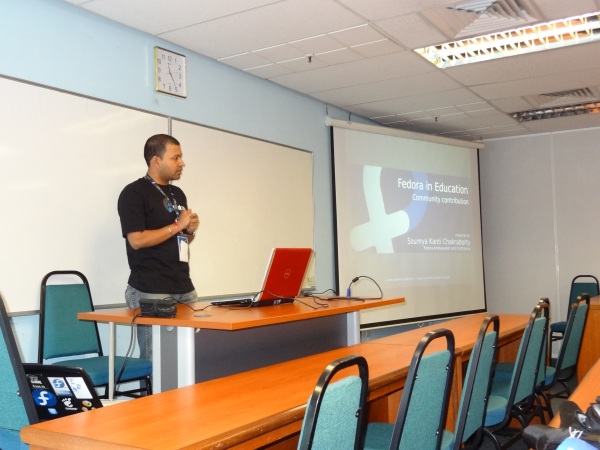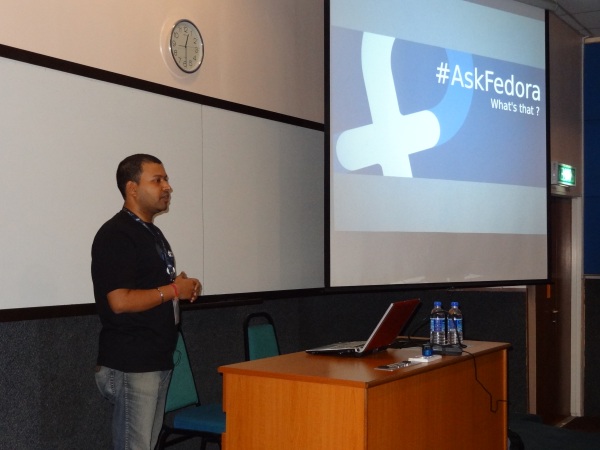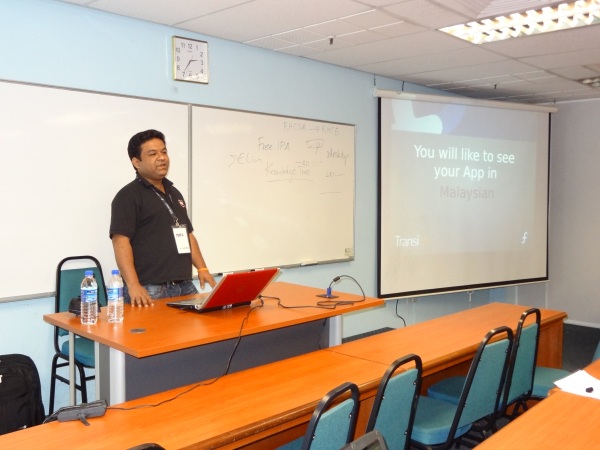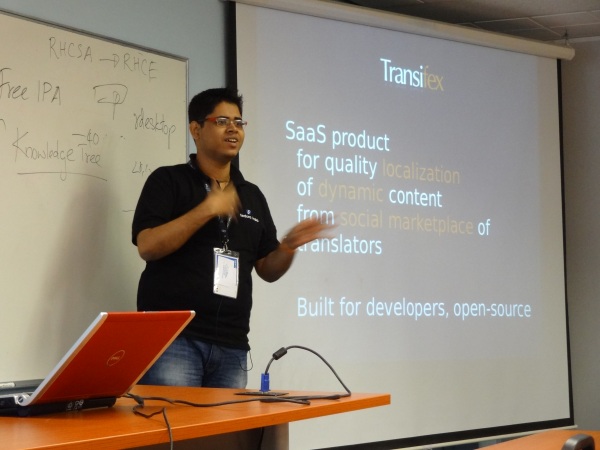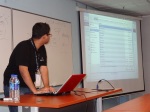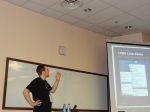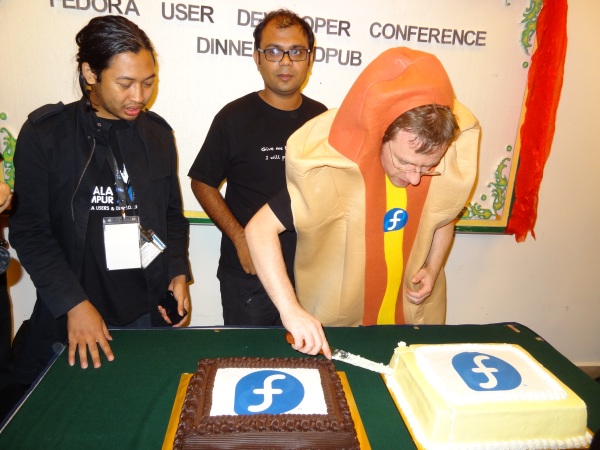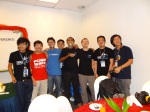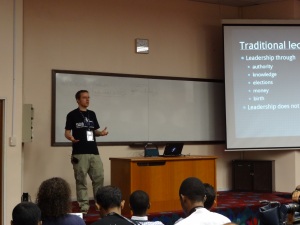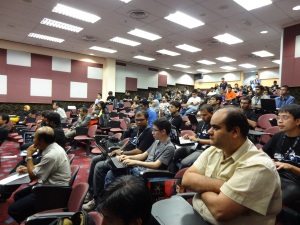Yesterday, I was working on adding app specific loggers in Transifex. By app specific logger I mean a logger which shows the app name which generated the log. As of now, the logs in Transifex look something like this:
2012-06-29 13:01:43,300 tx DEBUG Saved: Project Avant Window Navigator
2012-06-29 13:01:43,312 tx DEBUG Saved: Project Switchdesk
2012-06-29 13:01:43,324 tx DEBUG Saved: Project Usermode
2012-06-29 13:01:43,342 tx DEBUG Saved: Project desktop-effects
2012-06-29 13:01:43,349 tx DEBUG Saved: Project im-chooser
2012-06-29 13:01:43,355 tx DEBUG Saved: Project Test Project
2012-06-29 13:01:43,364 tx DEBUG Saved: Project Test Private Project
2012-06-29 13:01:45,704 tx DEBUG Saved: Project Test Project
2012-06-29 13:01:45,717 tx DEBUG Saved: Project Test Private Project
2012-06-29 13:01:45,731 tx DEBUG Resource Resource1: New ResourcePriority created.
It does not tell anything about which app generated the logs. In a first glance, fixing this looks pretty straight forward and dumb. All it needs it to customize this https://github.com/transifex/transifex/tree/devel/transifex/txcommon/log module for each app and instead of importing the logger from txcommon.log, import it from the log module inside the app.
But this would lead to a lot of code duplication and a lot of boring changes in the code. So, I decided to customize transifex.txcommon.log module itself so that it can detect the function calling the logger. It was pretty straight forward to do this for the handler at https://github.com/transifex/transifex/blob/devel/transifex/txcommon/log/receivers.py#L6: def model_named() in the following way:
import re
tx_module_regex = re.compile(
r'transifex(\.addons)?\.(?P<app_name>\w+)(\..*)?')
def model_named(sender, message='', **kwargs):
"""
Receive signals for objects with a .name attribute.
"""
from txcommon.log import _logger as logger
sender_module = sender.__module__
m = tx_module_regex.search(sender_module)
app_name = '.' + m.group('app_name') if m else ''
logger.name = 'tx' + app_name
obj = kwargs['instance']
logger.debug("%(msg)s %(obj)s %(name)s" %
{'msg': message,
'obj': sender.__name__,
'name': getattr(obj, 'name', '')})
sender is the object or instance for which the log is being generated. In our case, it’s a model instance. So, sender.__module__ gives the parent module for sender. Using regular expressions, we extract the app name from the module name and we set the name of the logger as ‘tx.<app_name>‘. And we are done here (for now)! But when we do something like
from transifex.txcommon.log import logger
logger.debug('foo bar')
we do not have a sender instance to allow us to find the calling module name. After some searching, I found about the inspect python module. And all I needed was inspect.stack(). Here’s what I did in https://github.com/transifex/transifex/tree/devel/transifex/txcommon/log/__init__.py:
- Write a wrapper around logger instance,
- find the caller calling the logger using stack.inspect(),
- accordingly set the logger name,
- and finally, log the event.
import logging, re, inspect
_logger = logging.getLogger('tx')
# regex to extract app name from a file path to a TXC app
tx_app_path_regex = re.compile(
r'txc/transifex(/addons)?/(?P<app_name>\w+)/(\..*)?')
class Logger:
"""
A wrapper class around _logger. This is used to log events
along with app names.
"""
@classmethod
def get_app_name_from_path(cls, path):
"""
Extracts app name from a file path to a TXC app
Args:
path: A string for the file path
Returns:
A string for the app name or ''
"""
m = tx_app_path_regex.search(path)
return m.group('app_name') if m else ''
@classmethod
def set_logger_name(cls):
"""
Sets logger name to show calling app's name.
"""
# inspect.stack()[2] since cls.debug() method has now become the
# immediate caller in of this method in the stack. We want the caller
# of cls.debug() or other logging method wrappers.
caller_module_path = inspect.stack()[2][1]
app_name = cls.get_app_name_from_path(caller_module_path)
_logger.name = 'tx' + '.%s' % app_name if app_name else ''
@classmethod
def debug(cls, *args, **kwargs):
"""Wrapper for _logger.debug"""
cls.set_logger_name()
_logger.debug(*args, **kwargs)
# And similarly for other logger methods like info(), waring(), error(), critical()
logger = Logger
Now, this is sweet! No one need to bother about logging events with app names. I am saved from editing hundreds of files and duplicating code 😉 It’s transparent and scalable. The logs now seem like:
2012-06-29 20:39:03,635 tx.projects DEBUG Saved: Project Foo Project
2012-06-29 20:39:05,575 tx.projects DEBUG Saved: Project Avant Window Navigator
2012-06-29 20:39:05,587 tx.projects DEBUG Saved: Project Switchdesk
2012-06-29 20:39:05,599 tx.projects DEBUG Saved: Project Usermode
2012-06-29 20:39:05,612 tx.projects DEBUG Saved: Project desktop-effects
..........
..........
..........
2012-06-29 22:15:07,088 tx.webhooks DEBUG Project project1 has no web hooks
2012-06-29 22:15:07,177 tx.releases DEBUG Deleted: ReleaseNotifications
2012-06-29 22:15:07,177 tx.releases DEBUG Deleted: Release All Resources
2012-06-29 22:15:07,466 tx.txcommon DEBUG Running low-level command 'msgfmt -o /dev/null --check-format --check-domain -'
2012-06-29 22:15:07,469 tx.txcommon DEBUG CWD: '/home/rtnpro/transifex/rtnpro/github/txc/transifex'
2012-06-29 22:15:07,661 tx.releases DEBUG release: Checking string freeze breakage.
2012-06-29 22:15:07,702 tx.resources DEBUG resource: Checking if resource translation is fully reviewed: Test Project: Resource1 (pt_BR)
2012-06-29 22:15:07,707 tx.webhooks DEBUG Project project1 has no web hooks
2012-06-29 22:15:07,740 tx.resources DEBUG resource: Checking if resource translation is fully reviewed: Test Project: Resource1 (ar)
2012-06-29 22:15:07,745 tx.webhooks DEBUG Project project1 has no web hooks
Thanks for reading. If you have any suggestions or query, please feel free to comment.

